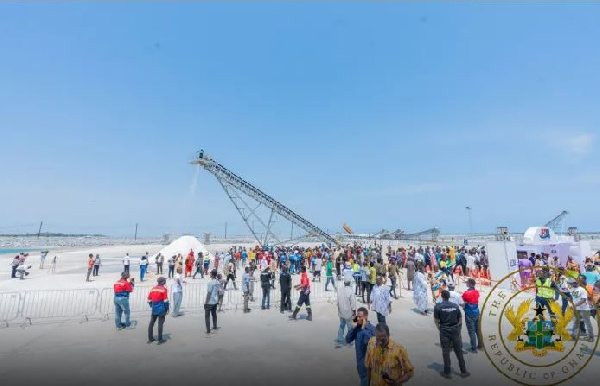In a bid to harness the untapped potential of Ghana’s salt industry, the Policy Initiative for Economic Development (PIED) Africa has issued a compelling call to investors, at a cocktail reception to welcome Prof. Iraki XN to Ghana.
This appeal seeks to rally support for the Ada Salt Project and, in particular, the forthcoming listing of Electrochem on the Ghana Stock Exchange (GSE).
The esteemed economist, Prof. XN, hails from the University of Nairobi, Kenya, and is a former fulbright scholar and assistant professor at Kentucky State University, USA, and is a fellow at PIED Africa.
Salt’s commercial promise
The discussion zeroed in on the vast commercial promise of salt. Dr. Daniel Amateye Anim, Chief Economist at PIED Africa, started the dialogue by referencing a report from the Business and Financial Times, titled ‘MIIF will invest GH¢300 million in Ada-Songor Salt project’. According to the publication, the Ada-Songor salt project holds the potential to become the country’s leading export commodity to the African market under the African Continental Free Trade Area (AfCFTA).
It is also estimated to yield about US$2 billion to the economy in the short-to-middle-term, making it one of the country’s major sources of foreign exchange by 2026 under AfCFTA when the Ada Songor Salt project is fully completed. With an initial production capacity of one million metric tonnes of salt per year, the project is to be scaled up to about two million tonnes by 2025. The concession meanwhile holds an ultimate capacity of 15 million tonnes per year when all phases are fully completed.
“With salt identified as a critical commodity for food security and industrialisation of the African continent, the 15 million capacity long-term target is projected to feed the demand of most countries on the continent – with Ghana and Senegal standing tall as the only countries with natural salt minerals in West Africa,” the publication captured.
These revelations served as a catalyst for a broader conversation on salt’s economic potential. It is on the back of this that the Vice President at PIED Africa, Alexander Aryee, expressed that the US$88 million Electrochem operated project has potential to contribute significantly to national development.
He underlined the significance of Ada Songor, Ghana’s largest natural salt mining area, which encompasses approximately 28,740 hectares along the eastern coast of the nation. Notably, Ada Songor holds the distinction of being designated a Ramsar wetland site of international importance in 1988 and part of UNESCO’s World Network of Biosphere Reserves since 2011.
Economic transformation
Dr. Daniel Amateye Anim, a native of Ada himself, expanded the discourse by emphasizing that salt’s economic potential extends beyond job creation. He projected that it could contribute a staggering US$2 billion to Ghana’s economy in the short- to medium term, highlighting the vital role of chemical industries in realizing this potential.
Prof. Iraki underscored the importance of government support for indigenous businesses, urging African entrepreneurs to consider listing their enterprises on stock markets. This, he argued, would enhance corporate governance and facilitate business expansion through capital infusion.
Electrochem’s listing on GSE
With the impending listing of Electrochem on the Ghana Stock Exchange (GSE), the Executive Group Chairman of Electrochem, Dr. Daniel McKorley, made it clear that the company is more than willing to open its doors to investors, especially those from Ghana.
He emphasized the transformative impact that the salt project could have on Ghana’s economy, emphasizing the need for local ownership.
Prof. Iraki commended Dr. McKorley’s leadership and commitment to listing Electrochem on the GSE.
Dr. Anim, on his part, called upon the people of Ada, both at home and abroad, to invest in Electrochem once it hits the stock exchange. This call extended to pension funds, trade unions, and associations to consider contributing to the Electrochem Salt Project.
A vision for a chemical university
Dr. McKorley unveiled plans to establish a chemical university aimed at training local experts in the petrochemical industry. This strategic move seeks to reduce reliance on foreign exprtise and, in the medium term, position the Ada Traditional Area as an education hub, fostering tourism and growth.
Dr. Amateye Anim called for unity among the people of Ada, encouraging them to set aside political differences and rally behind the salt project, which promises to catalyze development in the area.
PIED Africa’s support
Dr. Anim pledged PIED Africa’s support for Electrochem’s endeavors in the Ada Traditional Area. He stressed the importance of engaging youth and traditional rulers to convey the project’s significance to livelihoods and community development.
Lastly, Prof. Iraki suggested that PIED Africa organize a discussion around Electrochem and the Ada Salt Project as part of its “The Africa We Want Africa” series to attract investors from across the continent.
Mr. Alexander Aryee affirmed PIED’s management’s commitment to considering the professor’s advice in their future plans.
In conclusion, the event served as a call to action, highlighting the immense economic potential of Ghana’s salt industry and the critical role that both local and international investors can play in unlocking this potential. PIED Africa and Electrochem’s commitment to the project’s success was palpable, setting the stage for a transformative venture that could reshape the economic landscape of the region.
Source: thebftonline.com

